In a significant step towards deepening bilateral cooperation, India and Sri Lanka have signed a comprehensive multi-sectoral agreement aimed at boosting ties across trade, defence, energy, health, and culture. The landmark signing took place during Prime Minister Narendra Modi’s three-day official visit to Sri Lanka, which began on April 4.
This visit marks a reciprocal gesture to Sri Lankan President Anura Kumara Dissanayake, who had made India his first international destination in December 2024 following his election. Modi’s arrival in Colombo also marks the first foreign leader’s visit since Dissanayake assumed office, signalling a renewed warmth and diplomatic synergy between the two neighbouring nations.
From Diplomatic Dissonance to Constructive Dialogue
India-Sri Lanka relations had endured a turbulent phase under the previous Sri Lankan administration led by Ranil Wickremesinghe, especially amid the country’s economic collapse and growing alignment with China. Sri Lanka’s strategic pivot towards Beijing—driven by trade, infrastructure investments, and financial dependency—had raised alarms in New Delhi’s strategic circles.
However, the tone of bilateral engagement has notably shifted since President Dissanayake took office. Despite his leftist credentials, his pragmatic approach to foreign policy has emerged as a stabilizing force. Observers believe India’s timely and unwavering support during Sri Lanka’s economic recovery played a pivotal role in shaping this new chapter of cooperation.
Key Areas of Collaboration
The wide-ranging agreement signed by the two leaders encompasses:
- Defence collaboration
- Energy sector partnerships
- Trade and investment expansion
- Healthcare cooperation
- Digital transformation initiatives
- Cultural and religious infrastructure development
India reaffirmed its ‘Neighbourhood First’ policy and its commitment to regional stability through SAGAR (Security and Growth for All in the Region). In return, President Dissanayake reiterated that Sri Lankan soil would not be used for any activity that compromises India’s security interests.
Notably, seven Memoranda of Understanding (MoUs) were signed, including projects to support Sri Lanka’s digital governance, improve health services, and enhance temple infrastructure under India’s cultural assistance programme.
Reviving Historic Bonds
Beyond strategic and economic concerns, the two countries placed strong emphasis on their deep-rooted cultural ties. India pledged support for a capacity-building initiative aimed at training Sri Lankan professionals, along with assistance in developing a sacred temple complex that reflects shared spiritual heritage.
This collaboration serves not only as a diplomatic realignment but also as a reinforcement of the people-to-people connection between the two nations.
Looking Ahead
The latest developments indicate a clear intent by both India and Sri Lanka to recalibrate their relationship on mutually respectful and beneficial terms. As the region navigates shifting geopolitical dynamics, the synergy between Colombo and New Delhi may prove crucial for broader South Asian peace and prosperity.
Author: This news is edited by: Abhishek Verma, (Editor, CANON TIMES)
Authentic news.






